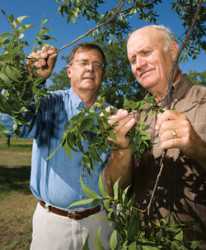Improving Organic Pecan Yields

Still, as part of his role as his unit’s research leader, he explored organic systems, and the more he learned, the more intrigued he became. In 2001, Bradford was contacted by Sonny Gebert, a pecan grower in north-central Texas, who had tuned into a radio show on which the hosts had mentioned Bradford’s research on organic crops. The two men met, and soon agreed that they would split the 800 trees in Gebert’s orchard. Bradford and his team would farm half organically, and Gebert would continue managing half conventionally.
The ARS system was based on first increasing the soil’s organic matter, balancing the nutrients and biology of the soil, and using organic pesticides only when needed. Bradford says that by improving the soil health, he thought the trees might become more naturally resistant to disease and insect attack. “It’s all about the soil,” says Bradford, a statement he repeats often.
Greater Quality
They studied five pecan varieties — Caddo, Cheyenne, Desirable, Pawnee, and Wichita — applying various organic amendments several times during the year to both the soil and the leaves. Treatments included poultry litter and compost, rock minerals, mycorrhizal fungi, and such nutrients as iron, zinc, boron, copper, and manganese.
Contrary to the conventional growers’ expectations, the organically treated site outyielded Gebert’s conventionally managed orchard in each of the five years. The best ARS treatment surpassed the Gebert control by 18 pounds per tree — 44.1 pounds compared to 25.9 pounds — in 2005 and by 12 pounds per tree — 45.1 pounds compared to 33.4 pounds — in 2007. Because pecans are alternate bearing, both orchards’ yields were very low in 2004 and 2006.
“This is the most successful organic project I have been involved with,” says the now-convinced Bradford. “The results are especially satisfying, because we have shown that it’s possible to grow nuts under an organic system that are far superior in looks and taste.”
Bradford says the difference in quality is astounding. The organically grown nuts have a more desirable golden hue, much lighter in color than the conventionally grown nuts. Also, while the conventional nuts have a shriveled appearance, the organic nuts are noticeably fatter and taste better, which Bradford says is probably due to a higher oil content. “If you crack some (organically grown) pecans and leave them out for a day in a paper bag, that bag will be stained with oil,” he says. “That’s not true for conventional pecans.”
Higher Profits
Unlike with some organic crops, however, the quality advantage of organic pecans directly translates into much larger profits for organic growers. Pecans from the Gebert orchard (Mr. Gebert could not be interviewed as he passed away in early 2008) generally sell for about $2 a pound wholesale. With an average yield of 25 pounds per tree and roughly 35 trees per acre, the crop generates about $1,750 per acre.
But organic pecans generally sell for $3.50, or about $1.50 more per pound, says Bradford. The ARS organic system yielded 44 pounds per tree, so even though the organic system had added costs of $100 per acre, that was easily superseded by the increased yields and higher prices. In fact, the organically farmed trees paid off to the tune of a whopping $3,540 per acre above the returns from the conventionally managed system.
The results no longer surprise Bradford, who says all farming starts with the soil. “The conventional farmer farms the tree or the plant — the crop — but the organic farmer farms the soil,” he says. “Whatever you can do to improve the soil — it’s all about the soil — will pay off. It doesn’t make any difference what you’re growing.”









